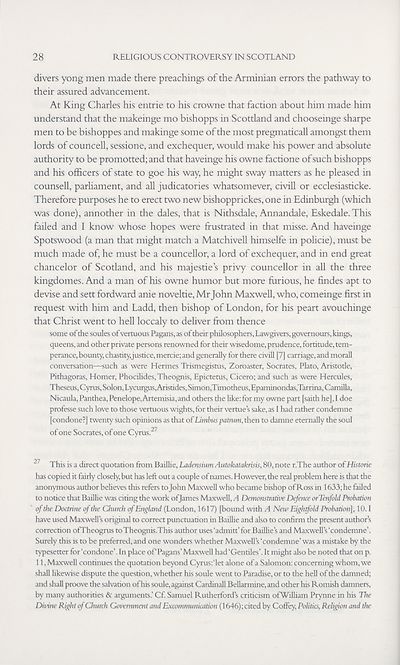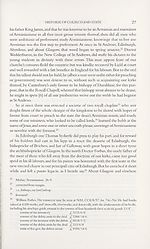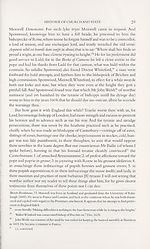Series 5 > Religious Controversy in Scotland 1625-1639
(43) Page 28
Download files
Complete book:
Individual page:
Thumbnail gallery: Grid view | List view

28
RELIGIOUS CONTROVERSY IN SCOTLAND
divers yong men made there preachings of the Arminian errors the pathway to
their assured advancement.
At King Charles his entrie to his crowne that faction about him made him
understand that the makeinge mo bishopps in Scotdand and chooseinge sharpe
men to be bishoppes and makinge some of the most pregmaticall amongst them
lords of councell, sessione, and exchequer, would make his power and absolute
authority to be promotted; and that haveinge his owne factione of such bishopps
and his officers of state to goe his way, he might sway matters as he pleased in
counsell, parliament, and all judicatories whatsomever, civill or ecclesiasticke.
Therefore purposes he to erect two new bishopprickes, one in Edinburgh (which
was done), annother in the dales, that is Nithsdale, Annandale, Eskedale. This
failed and I know whose hopes were frustrated in that misse. And haveinge
Spotswood (a man that might match a Matchivell himselfe in policie), must be
much made of, he must be a councellor, a lord of exchequer, and in end great
chancelor of Scotland, and his majestie’s privy councellor in all the three
kingdomes. And a man of his owne humor but more furious, he Andes apt to
devise and sett fordward anie noveltie, Mr John Maxwell, who, comeinge first in
request with him and Ladd, then bishop of London, for his peart avouchinge
that Christ went to hell loccaly to deliver from thence
some of the soules of vertuous Pagans, as of their philosophers, Lawgivers, governours, kings,
queens, and other private persons renowned for their wisedome, prudence, fortitude, tem¬
perance, bounty, chastity, justice, mercie; and generally for there civill [7] carriage, and morall
conversation—such as were Hermes Trismegisms, Zoroaster, Socrates, Plato, Aristode,
Pithagoras, Homer, Phocilides,Theognis, Epictems, Cicero; and such as were Hercules,
Theseus, Cyrus, Solon, Lycurgus, Aristides, Simon,Timotheus, Epaminondas,Tarrina, Camilla,
Nicaula, Panthea,Penelope,Artemisia, and others the like: for my owne part [saith he], I doe
professe such love to those vertuous wights, for their vertue’s sake, as I had rather condemne
[condone?] twenty such opinions as that of Limbus patrum, then to damne eternally the soul
of one Socrates, of one Cyrus.27
27 This is a direct quotation from Baillie, Ladensium Autokatakrisis, 80, note r.The author of Histone
has copied it fairly closely, but has left out a couple of names. However, the real problem here is that the
anonymous author believes this refers to John Maxwell who became bishop ofRoss in 1633;he failed
to notice that Baillie was citing the work ofjames Maxwell, H Demonstrative Defence orTenfold Probation
' of the Doctrine of the Church of England (London, 1617) [bound with A New Eightfold Probation], 10.1
have used Maxwell’s original to correct punctuation in Baillie and also to confirm the present author’s
correction ofTheogrus toTheognis.This author uses‘admitt’for Baillie’s and Maxwell’s‘condemne’.
Surely this is to be preferred, and one wonders whether Maxwell’s ‘condemne’ was a mistake by the
typesetter for‘condone’. In place of Pagans’ Maxwell had‘Gentiles’. It might also be noted that on p.
11, Maxwell continues the quotation beyond Cyrus:‘let alone of a Salomon: concerning whom, we
shall likewise dispute the question, whether his soule went to Paradise, or to the hell of the damned;
and shall proove the salvation of his soule, against Cardinall Bellarmine, and other his Romish damners,
by many authorities & arguments.’ Cf. Samuel Rutherford s criticism ofWilliam Prynne in his The
Divine Right of Church Government and Excommunication (1646); cited by Coffey, Politics, Religion and the
RELIGIOUS CONTROVERSY IN SCOTLAND
divers yong men made there preachings of the Arminian errors the pathway to
their assured advancement.
At King Charles his entrie to his crowne that faction about him made him
understand that the makeinge mo bishopps in Scotdand and chooseinge sharpe
men to be bishoppes and makinge some of the most pregmaticall amongst them
lords of councell, sessione, and exchequer, would make his power and absolute
authority to be promotted; and that haveinge his owne factione of such bishopps
and his officers of state to goe his way, he might sway matters as he pleased in
counsell, parliament, and all judicatories whatsomever, civill or ecclesiasticke.
Therefore purposes he to erect two new bishopprickes, one in Edinburgh (which
was done), annother in the dales, that is Nithsdale, Annandale, Eskedale. This
failed and I know whose hopes were frustrated in that misse. And haveinge
Spotswood (a man that might match a Matchivell himselfe in policie), must be
much made of, he must be a councellor, a lord of exchequer, and in end great
chancelor of Scotland, and his majestie’s privy councellor in all the three
kingdomes. And a man of his owne humor but more furious, he Andes apt to
devise and sett fordward anie noveltie, Mr John Maxwell, who, comeinge first in
request with him and Ladd, then bishop of London, for his peart avouchinge
that Christ went to hell loccaly to deliver from thence
some of the soules of vertuous Pagans, as of their philosophers, Lawgivers, governours, kings,
queens, and other private persons renowned for their wisedome, prudence, fortitude, tem¬
perance, bounty, chastity, justice, mercie; and generally for there civill [7] carriage, and morall
conversation—such as were Hermes Trismegisms, Zoroaster, Socrates, Plato, Aristode,
Pithagoras, Homer, Phocilides,Theognis, Epictems, Cicero; and such as were Hercules,
Theseus, Cyrus, Solon, Lycurgus, Aristides, Simon,Timotheus, Epaminondas,Tarrina, Camilla,
Nicaula, Panthea,Penelope,Artemisia, and others the like: for my owne part [saith he], I doe
professe such love to those vertuous wights, for their vertue’s sake, as I had rather condemne
[condone?] twenty such opinions as that of Limbus patrum, then to damne eternally the soul
of one Socrates, of one Cyrus.27
27 This is a direct quotation from Baillie, Ladensium Autokatakrisis, 80, note r.The author of Histone
has copied it fairly closely, but has left out a couple of names. However, the real problem here is that the
anonymous author believes this refers to John Maxwell who became bishop ofRoss in 1633;he failed
to notice that Baillie was citing the work ofjames Maxwell, H Demonstrative Defence orTenfold Probation
' of the Doctrine of the Church of England (London, 1617) [bound with A New Eightfold Probation], 10.1
have used Maxwell’s original to correct punctuation in Baillie and also to confirm the present author’s
correction ofTheogrus toTheognis.This author uses‘admitt’for Baillie’s and Maxwell’s‘condemne’.
Surely this is to be preferred, and one wonders whether Maxwell’s ‘condemne’ was a mistake by the
typesetter for‘condone’. In place of Pagans’ Maxwell had‘Gentiles’. It might also be noted that on p.
11, Maxwell continues the quotation beyond Cyrus:‘let alone of a Salomon: concerning whom, we
shall likewise dispute the question, whether his soule went to Paradise, or to the hell of the damned;
and shall proove the salvation of his soule, against Cardinall Bellarmine, and other his Romish damners,
by many authorities & arguments.’ Cf. Samuel Rutherford s criticism ofWilliam Prynne in his The
Divine Right of Church Government and Excommunication (1646); cited by Coffey, Politics, Religion and the
Set display mode to:
![]() Universal Viewer |
Universal Viewer | ![]() Mirador |
Large image | Transcription
Mirador |
Large image | Transcription
Images and transcriptions on this page, including medium image downloads, may be used under the Creative Commons Attribution 4.0 International Licence unless otherwise stated. ![]()
| Scottish History Society volumes > Series 5 > Religious Controversy in Scotland 1625-1639 > (43) Page 28 |
|---|
| Permanent URL | https://digital.nls.uk/127328481 |
|---|
| Description | Over 180 volumes, published by the Scottish History Society, containing original sources on Scotland's history and people. With a wide range of subjects, the books collectively cover all periods from the 12th to 20th centuries, and reflect changing trends in Scottish history. Sources are accompanied by scholarly interpretation, references and bibliographies. Volumes are usually published annually, and more digitised volumes will be added as they become available. |
|---|


